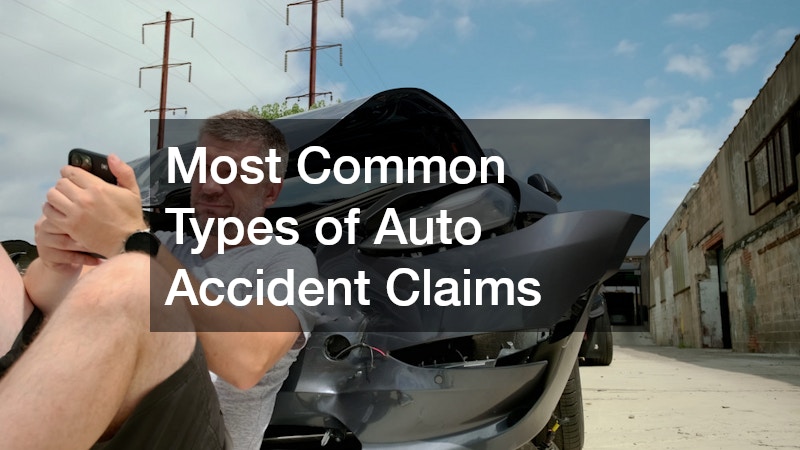Most Common Types of Auto Accident Claims


This article explores the most common types of auto accident claims, providing insights into the legal processes and what drivers should expect. Understanding these claims is crucial for anyone involved in an auto accident, and consulting an experienced auto accident attorney can guide them through their legal rights and help secure fair compensation.
Understanding Fault in Auto Accident Claims
What Determines Fault in an Auto Accident?
Determining fault in an auto accident is a complex process involving various pieces of evidence. Police reports, for instance, play a pivotal role, as they document the scene and provide an unbiased account of what transpired.
Additionally, witness statements are essential in corroborating details such as the behavior of the drivers involved at the time of the accident. These testimonies can reveal critical aspects that might not be covered by physical evidence alone.
Finally, adherence to traffic laws is a fundamental factor in assessing fault. Breaking traffic rules, such as speeding or running a red light, can significantly influence the outcome and determination of liability.
The Impact of Fault on Insurance Claims
The determination of fault in an auto accident profoundly affects insurance claims. Insurance companies use this information to allocate financial responsibility, impacting the premiums and payouts involved.
Parties found at fault may face higher insurance premiums, whereas those not at fault could seek compensation for damages from the other driver’s insurer. This highlights the importance of accurately determining fault to ensure a just financial outcome.
The financial consequences for the responsible party can be extensive, including repair costs and potential legal fees. Thus, understanding how fault influences the claims process is paramount for all involved parties.
Types of Damages in Auto Accident Claims
Economic Damages Explained
Economic damages in auto accident claims typically encompass tangible losses, such as medical expenses. Injured parties can seek reimbursement for hospital bills, therapy sessions, and other healthcare costs incurred due to the accident.
Additionally, vehicle repair costs constitute a significant portion of economic damages. Damaged cars may require extensive repairs or even replacement, leading to substantial financial strains.
Compensation for lost wages also falls under economic damages. When an accident renders an individual unable to work, the resulting loss of income is a legitimate and compensable claim.
Understanding Non-Economic Damages
Non-economic damages arise from the intangible effects of an auto accident, such as pain and suffering. Unlike economic losses, these damages lack a direct monetary equivalent and are subjective in nature.
Emotional distress is another form of non-economic damage. Surveys indicate that the psychological impact of auto accidents can linger long after physical wounds have healed.
Finally, the loss of enjoyment of life is a critical consideration in awarding non-economic damages. Accidents can radically alter individuals’ daily routines, restricting their ability to partake in activities they once enjoyed.
How to File an Auto Accident Claim
Steps in Filing a Claim
The first crucial step in filing an auto accident claim is gathering comprehensive evidence. Photographs of the scene and damages, along with obtaining formal records such as police reports, form the backbone of a solid claim.
Once gathered, this evidence should be communicated effectively to relevant insurance companies. Notifying all involved parties and ensuring clear documentation will expedite the claims process.
Subsequently, maintaining thorough records of medical bills, vehicle repairs, and other related expenses is essential. These documents substantiate the requested compensation and streamline the claims process.
Common Challenges in Claims Processing
Despite preparation, several common challenges can arise during the claims process. Disputes over damages, for instance, frequently occur when parties disagree on repair costs or responsibility for the accident.
Delays are another prominent issue that can hinder the timely resolution of claims. Factors such as incomplete information or prolonged investigations can contribute to extended processing times.
Insurance denials further complicate matters, often occurring when insurers dispute the validity of the claims. This emphasizes the importance of comprehensive documentation and persistence too often prevail in such scenarios.
Dealing with Insurance Companies
Negotiating a Settlement
Successfully negotiating a settlement with insurance companies requires strategic communication. Presenting a well-documented claim, supported by persuasive evidence, forms a strong foundation for negotiations.
Understanding the underlying valuation of damages, both economic and non-economic, is critical. Having a clear figure in mind aids in setting realistic negotiation goals and expectations.
Moreover, maintaining a cooperative and professional demeanor throughout negotiations can create a more favorable climate for resolution. Effective communication increases the likelihood of arriving at a fair and satisfactory settlement.
When to Consider Legal Representation
In certain circumstances, seeking legal representation might be advantageous for negotiating auto accident claims. An experienced attorney can provide invaluable insights into the nuances of the claims process.
When disputes about liability or compensation arise, having legal counsel ensures that a claimant’s rights are protected and thoroughly advocated for. Lawyers can navigate complex legalities, particularly when third-party claims or counterclaims are involved.
Additionally, the involvement of an attorney can often expedite the resolution timeframe and improve the overall outcome. Therefore, individuals should carefully consider the benefits of legal representation in contentious or high-stakes claims.
Understanding the different types of auto accident claims is essential for anyone involved in a collision. Being informed about the legal processes, potential outcomes, and necessary documentation can make a significant difference in achieving a fair resolution. Seeking guidance from a skilled auto accident attorney ensures that your rights are protected and that you have the best chance of securing appropriate compensation. Proper preparation, knowledge, and professional support are key to navigating these challenging situations with confidence and clarity.


